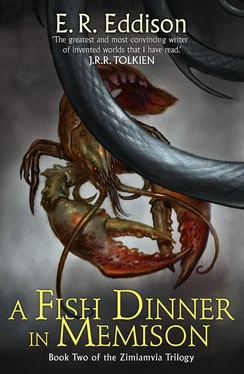Sub specie aeternitatis , therefore, this present world is understandable only on the assumption that its reality is not final but partial. On two alternative hypotheses might it thus be credible—
1 as something in the making , which in future aeons will become perfect;
2 as an instrument of , a training-ground or testing place.
Both hypotheses, however, present difficulties: (1) Why need omnipotence wait for future aeons to arrive? why have imperfections at all? (2) (The same difficulty in a different aspect) If perfection were available – and, to omnipotence, what is not? – why need omnipotence arrange for tests or trainings?
We are forced back, therefore, on the question: if illusion, why is there this illusion?
There seems to be no clear answer to this question; and no certain test (short of experience) of the truth of any particular experience. This world has got to be lived through, and the best way of living through it is a question for ethics : the science of the Good in action. A ‘good’ action is an action of Love, i.e. (see above) an action which serves Beauty . The ‘good’ man in action is therefore doing, so far as his action is good, and so far as his power goes, what the divine eternal Masculine is doing: creating, serving, worshipping, enjoying and loving Her, the divine eternal Feminine. And, by complement, the ‘good’ woman in action is doing, so far as in her lies, what the divine eternal Feminine is doing; completing and making up, that is to say, in her unique person, by and in her action and by and in her passivity, ‘whatsoever is or has been or shall be desirable, were it in earth or heaven’. In action therefore, this is ‘All ye know on earth, and all ye need to know.’
But man is not  only, but
only, but  – concerned not with action only but with contemplation – and the unanswered questions in the third preceding paragraph remain. May there possibly be one answer to both? viz. that there is no necessity for these peculiar and (to us) inconvenient arrangements, but that – for the moment – they are amusing?
– concerned not with action only but with contemplation – and the unanswered questions in the third preceding paragraph remain. May there possibly be one answer to both? viz. that there is no necessity for these peculiar and (to us) inconvenient arrangements, but that – for the moment – they are amusing?
That they are far from ‘ amusing ’ to us , here and now – that they daily, for some or other of their helpless victims, produce woes and agonies too horrible for man to endure or even think of – is perhaps because we do not, in the bottom of our hearts, believe in our own immortality and the immortality of those we love. If, for you and me as individuals, this world is the sum, then much of it in detail (and the whole in general plan) is certainly not amusing. But to a mind developed on the lines of the Mahometan fanatic’s, the Thug’s, the Christian martyr’s, is it not conceivable that (short, perhaps, of acute physical torture) the ‘slings and arrows of outrageous fortune’ should be no more painful than the imagined ills of a tragic drama, and could be experienced and appraised with a like detachment? The death of your nearest and dearest, e.g., would be but a deepening of experience for you, if you could believe and know (beyond peradventure and with that immediacy which belongs to sense experience) that there is no death, except of the body in this transient and unsatisfactory life; that Truth rests indeed in that eternal duality whereby the One Value is created and tendered by the One Power; that the Truth is not abstract and bodiless, but concrete in all imaginable richness of spirit and sense; that the parting is therefore but for a while; and, last, that the whole of human history, and the material cosmos known to science, are but trivial occurrences – episodes invented perhaps, and then laid aside, as we ourselves might conceive and in a few minutes reject again some theory of the universe, in conversation after supper.
It may be asked, Why not suicide, then, as a way out? Is not that the logic of such an other-worldly philosophy? The answer surely is that there is a beauty of action (as the Northmen knew), and only seldom is suicide a fine act. Unless it is time to ‘do it in the high Roman fashion’: unless we stand where Othello stood, or Cleopatra, suicide is an ignoble act, and (as such) little to Her liking. The surer we are of Her, therefore, the less we are likely to take, in despair, that dark leap which (though not, as is vulgarly said, an act of cowardice: it demands much courage if done deliberately) is essentially a shirking of the game She sets us. And that game (as no one will doubt, who has looked in the eyes of ‘sparkling-thronèd heavenly Aphrodite, child of God, beguiler of guiles’) is a game which, to please Her, we must play ‘acording to its strict rules’.
This book can be read as well before as after Mistress of Mistresses . The chief persons appear in both books, but each is a self-contained work complete in itself.
Yours affectionately,
E. R. E.
Dark Lane
Marlborough
Wiltshire
29th July 1940
THE KING
BARGANAX, DUKE OF ZAYANA
EDWARD LESSINGHAM
LADY MARY LESSINGHAM
THE DUCHESS OF MEMISON
FIORINDA
‘ÇA M’AMUSE.’ The words, indolent, indolently fallen along the slowness of a lovely lazy voice, yet seemed to strike night, no, Time itself, with a sudden division; like as when that bare arrow-like three-octave E, high on the first violin, deep on the cello, stabs suddenly the witched quietude of the andante in the third Rasoumoffsky Quartet. A strange trick, indeed, in a woman’s voice: able so, with a chance phrase overheard, to snatch the mind from its voyaging in this skiff between sightless banks: snatch and translate it so, to some stance of rock, archaean, gripping the boot-nails, high upon mountains; whence, as gathering your senses out of sleep, you should seem to discern the true nature of the stream of things. And here, tonight, in Verona—
Lessingham looked round, quickly enough to catch the half mocking, half listening, inclination of her head as her lips closed upon the lingering last syllable of that private ‘m’amuse’. The words had been addressed, it was clear, to nobody, for she was alone at her table: certainly not to him: not even (curiously) to herself: to velvet-bosomed Night, possibly, sister to sister: to the bats, the inattentive stars, this buzz of Latin night-life; little white tables with their coffee, vino rosso , vino bianco , carafe and wine-glass, the music and the talk; wreaths of cigar-smoke and cigarette-smoke that hung and dissipated themselves on airs that carried from the flower-beds of the mid piazza a spring fragrancy and, from the breathing presences of women, wafts of a more exotic and a deeper stirring sweetness. Over all, the tremendous curved façade of Diocletian’s amphitheatre, ruined deep in time, stood desolate in the glare of electric arclights. In Lessingham’s hand arrested on the table-top, the cigar went out. Into the stillness all these things – amphitheatre, electric lights, the Old and the New, this simple art of living, the bat-winged night, the open face of the dark – seemed to gather and, with the slow upsurging might of their rise, to reach to some timeless moment which seemed her; and which seemed as fixed, while beyond it life and the hours streamed unseizable as the unseizable down-streaming spray-motes into which water is dissipated when it falls clear over a great height – Ça m’amuse .
Then, even as in the andante the processional secular throb of the arpeggios, so Time seemed now to recover balance: catch breath: resume its inexplicable unseizable irreversible way. Not to be explained, yet upon that echo illuminated: not to be caught, yet (for that sudden) unprecedentedly submitting itself within hand-reach: not to be turned back, yet suddenly self-confessed as perhaps not worth the turning. She looked up, and their eyes met.
Читать дальше

 only, but
only, but  – concerned not with action only but with contemplation – and the unanswered questions in the third preceding paragraph remain. May there possibly be one answer to both? viz. that there is no necessity for these peculiar and (to us) inconvenient arrangements, but that – for the moment – they are amusing?
– concerned not with action only but with contemplation – and the unanswered questions in the third preceding paragraph remain. May there possibly be one answer to both? viz. that there is no necessity for these peculiar and (to us) inconvenient arrangements, but that – for the moment – they are amusing?










